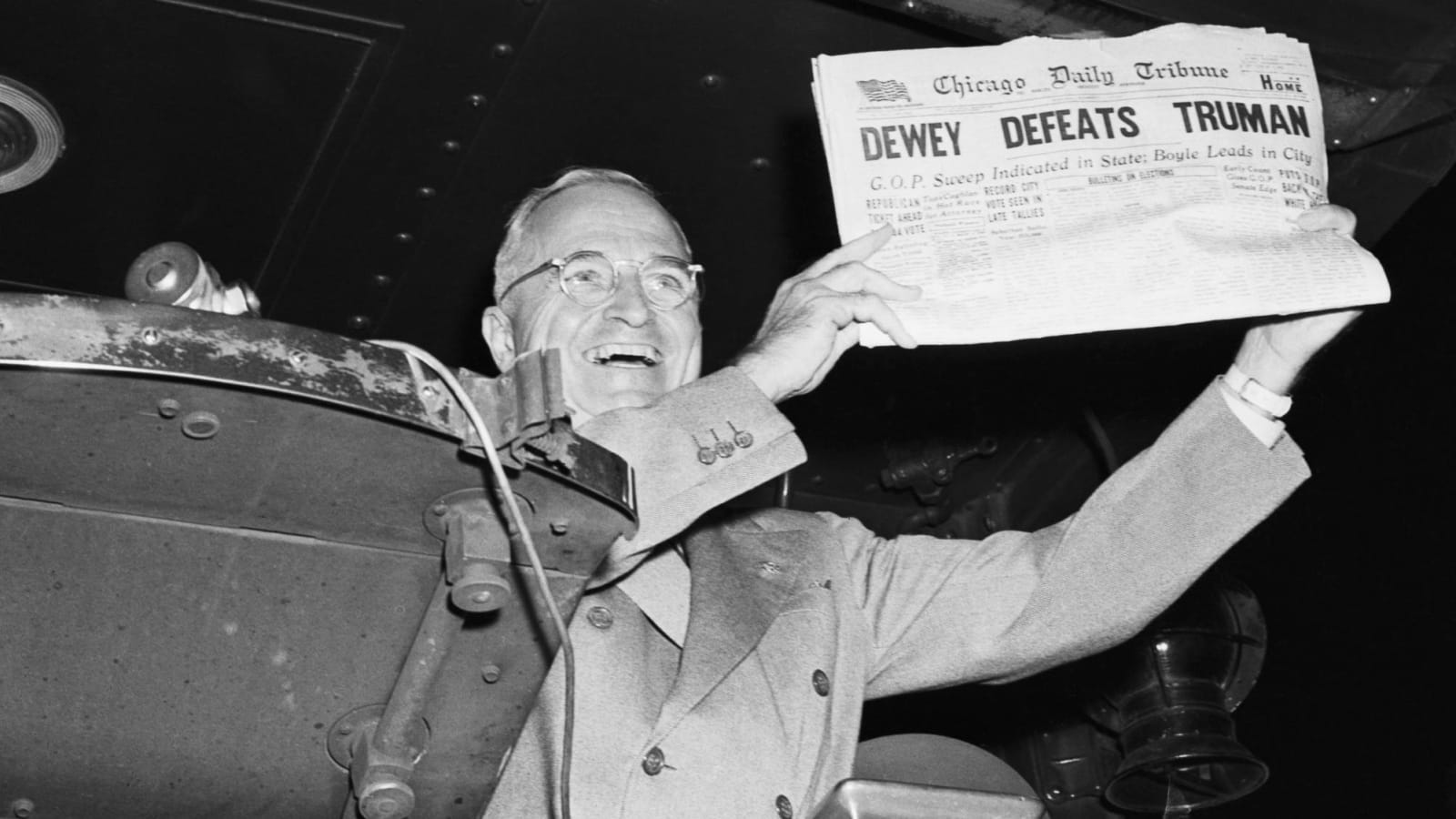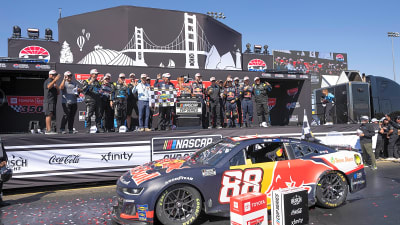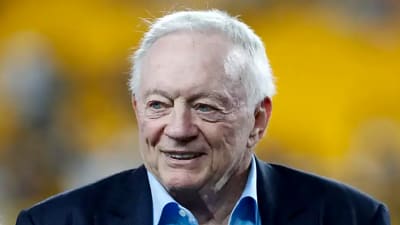- Home
- Quizzes
- My Quiz Activity
- Newsletters
- MY FAVORITES
- Add Sports/Teams
- SPORTS
-
NFL
- NFL Home
- Arizona Cardinals
- Atlanta Falcons
- Baltimore Ravens
- Buffalo Bills
- Carolina Panthers
- Chicago Bears
- Cincinnati Bengals
- Cleveland Browns
- Dallas Cowboys
- Denver Broncos
- Detroit Lions
- Green Bay Packers
- Houston Texans
- Indianapolis Colts
- Jacksonville Jaguars
- Kansas City Chiefs
- Las Vegas Raiders
- Los Angeles Chargers
- Los Angeles Rams
- Miami Dolphins
- Minnesota Vikings
- New England Patriots
- New Orleans Saints
- New York Jets
- New York Giants
- Philadelphia Eagles
- Pittsburgh Steelers
- San Francisco 49ers
- Seattle Seahawks
- Tampa Bay Buccaneers
- Tennessee Titans
- Washington Commanders
-
MLB
- MLB Home
- Athletics
- Arizona Diamondbacks
- Atlanta Braves
- Baltimore Orioles
- Boston Red Sox
- Chicago White Sox
- Chicago Cubs
- Cincinnati Reds
- Cleveland Guardians
- Colorado Rockies
- Detroit Tigers
- Houston Astros
- Kansas City Royals
- Los Angeles Angels
- Los Angeles Dodgers
- Miami Marlins
- Milwaukee Brewers
- Minnesota Twins
- New York Yankees
- New York Mets
- Philadelphia Phillies
- Pittsburgh Pirates
- San Diego Padres
- San Francisco Giants
- Seattle Mariners
- St. Louis Cardinals
- Tampa Bay Rays
- Texas Rangers
- Toronto Blue Jays
- Washington Nationals
-
NBA
- NBA Home
- Atlanta Hawks
- Boston Celtics
- Brooklyn Nets
- Charlotte Hornets
- Chicago Bulls
- Cleveland Cavaliers
- Dallas Mavericks
- Denver Nuggets
- Detroit Pistons
- Golden State Warriors
- Houston Rockets
- Indiana Pacers
- Los Angeles Clippers
- Los Angeles Lakers
- Memphis Grizzlies
- Miami Heat
- Milwaukee Bucks
- Minnesota Timberwolves
- New Orleans Pelicans
- New York Knicks
- Oklahoma City Thunder
- Orlando Magic
- Philadelphia 76ers
- Phoenix Suns
- Portland Trail Blazers
- Sacramento Kings
- San Antonio Spurs
- Toronto Raptors
- Utah Jazz
- Washington Wizards
-
NHL
- NHL Home
- Anaheim Ducks
- Boston Bruins
- Buffalo Sabres
- Calgary Flames
- Carolina Hurricanes
- Chicago Blackhawks
- Colorado Avalanche
- Columbus Blue Jackets
- Dallas Stars
- Detroit Red Wings
- Edmonton Oilers
- Florida Panthers
- Los Angeles Kings
- Minnesota Wild
- Montreal Canadiens
- Nashville Predators
- New Jersey Devils
- New York Islanders
- New York Rangers
- Ottawa Senators
- Philadelphia Flyers
- Pittsburgh Penguins
- San Jose Sharks
- Seattle Kraken
- St. Louis Blues
- Tampa Bay Lightning
- Toronto Maple Leafs
- Utah Mammoth
- Vancouver Canucks
- Vegas Golden Knights
- Washington Capitals
- Winnipeg Jets
- NCAAF
- NCAAM
- Olympics
- Boxing
- Entertainment
- Lifestyle
- Golf
- MMA
- Soccer
- Tennis
- Wrestling
- Sports Betting
- More Sports
- RESOURCES
- My Account
- YB on Facebook
- YB on Twitter
- YB on Flipboard
- Contact Us
- Privacy Policy
- Terms of Service

Looking back at the electoral college results from every U.S. election
As everybody knows after the 2016 election, winning the popular vote in the United States doesn’t mean you become President. Instead, you need to win the Electoral College. Each state is given a certain number of electors based on their population. Currently, there are 538 electors, and a candidate must win 270 of them to be elected President of the United States. The Electoral College has been around since the first ever U.S. Presidential election, but there haven’t always been so many electors. Here is a look at every presidential election in the history of America based on electoral college votes. There are a few times that fans of direct democracy will want to shield their eyes, starting with the first election we’re diving into.
2016

As you may have heard, the 2016 election was contentious. It also got those who seek to abolish the electoral college quite aggravated once again. Hillary Clinton won the popular vote over Donald Trump by a larger margin than any previous electoral college loser. Alas, Clinton did indeed lose when it came to the electoral college. Thanks to a few key state wins, Trump ended up with 304 electors.
2012

Barack Obama won a second term in 2012, but it was a closer battle than his win in 2008. Facing off against a fairly moderate Republican in Mitt Romney, Obama won 332 of the electors, which was a step down but still a safe victory.
2008

In 2008, the young, rising Obama faced off with veteran politician, and war veteran, John McCain. McCain infamously chose Sarah Palin as his running mate to appease the Tea Party types. He ended up getting crushed by over 9.5 million votes. Obama also took home 365 electors.
2004

George W. Bush won an extremely competitive election 2000, and some would argue he didn’t actually win. There were no such arguments in 2004. Facing John Kerry, Bush won a second term with 286 electors. That’s far from a landslide, but it was a bigger win than 2000.
2000

After all, in 2000 Bush became the first president in over a century not to win the popular vote. The margin was quite thin, barely over half a million people, which led to many a hanging chad being counted down in Florida. Bush needed every one of those electors, as he finished with only 271 of them. As you know, 270 is needed to win an election. If one state had gone in a different direction Bush may have never been President, and Al Gore might have never won a Nobel Prize.
1996

Bill Clinton’s second term was marred by his impeachment, but he won the election in a walk. Bob Dole was not competition for the popular President. Clinton took home 379 electors, though in an election with a reported turnout of only 51.7 percent. That’s the lowest total since the 1920s.
1992

The opinion on George H.W. Bush turned quite quickly in this country. As you’ll see, he destroyed the competition in the 1988 election. However, after one term he was beaten by Bill Clinton by almost six million votes. The Arkansas governor also took 370 of the electors.
1988

George H.W. Bush was likely riding the wave of being Ronald Reagan’s vice president into this election. He also faced a pretty unpopular Democrat in Michael Dukakis. He rode in a tank once. That might explain why he was beaten so soundly by Clinton after winning 426 electors in 1988.
1984

Walter Mondale didn’t stand a chance. Reagan’s victory to claim his second term is arguably the most-decisive victory ever. After all, he took 525 of the 538 electors. Only Mondale’s home state of Minnesota and, oddly, Washington D.C. went against Reagan.
1980

Not that Reagan wasn’t already clearly popular based on the election of 1980. Going up against Jimmy Carter, the former actor won 489 electors. No president has been as popular as Reagan, at least going by the election results and the electoral college.
1976

Gerald Ford, who had taken over for Richard Nixon, was facing his first election. It was a tight battle between him and Jimmy Carter, the mild-mannered governor of Georgia. It was a close election, but Carter eked it out. He took 297 of the electors while also squeezing out a win in the popular vote.
1972

You know how Richard Nixon’s campaign team broke into the Watergate in their desire to get Nixon reelected president? It feels weird they thought that would be necessary at all. Nixon crushed George McGovern in the election. He won 520 of the electors, and he won the popular vote by almost 18 million, the most in history.
1968

Nixon’s first run for president had ended poorly, but we’ll get to that momentarily. In 1968 the election cycle was chaotic, especially among the Democrats. In the end, they were left running Hubert Humphrey. Nixon finally became president after years of trying, though he only won 301 electors and won the popular vote by just over 500,000.
1964

Lyndon B. Johnson had served as vice president of the popular John F. Kennedy, taking over as president after JFK’s assassination. Johnson’s opponent was the ultra conservative (for the time) Barry Goldwater. The appetite for that kind of conservatism wasn’t there. LBJ won 486 electors and won his first elected term in a walk.
1960

The election between Kennedy and Nixon was a huge one. Not only was if the first time a presidential debate was televised, it was a hotly contested affair. JFK beat Nixon in the popular vote by barely over 100,000 (you may want to thank some folks in Chicago for that) and won 303 electors. Nixon would return to be kicked around once more.
1956

This is a fascinating election, because the exact same two people also ran in 1952. Both times, Dwight Eisenhower beat Adlai Stevenson. In 1956, his victory was even more resounding. Ike won 457 of the electors. It should be noted that, back then, there were only 531 electors as well.
1952

Like we said, this election was a preview of1956. Popular World War II veteran Eisenhower was squaring off with a more traditional politician in Stevenson. People were feeling good and babies were booming. They happily voted in Eisenhower, and he took 442 electors to his name.
1948

You’ve probably seen the famous photo of Harry Truman holding up a newspaper declaring that Thomas Dewey had defeated him in the election. That turned out to be a bit of a leap. While it was a close election, Truman had picked up 303 of the electors and won the popular vote as well. Better luck next time, print media!
1944

Franklin Delano Roosevelt was running for his fourth term in office in 1944, and voters has seemingly lost some interest in him, perhaps due to age. That may have been warranted, given that FDR died during this term. However, he still won the election, beating the aforementioned Thomas Dewey. However, his 432 electors was the fewest he ever won.
1940

You know that FDR won this election as well, this time beating the delightfully named Wendell Wilkie. Europe was at war, but the United States had not joined yet. They would during this term. As for the election, won 449 electors, so it was a fairly comfortable win.
1936

This was the one year the voters unequivocally loved Roosevelt. Maybe they were happy with how the New Deal was going. Maybe they just despite Alf Landon, the Republican nominee. All we know is that he 523 of the 531 electors. By percentages, that’s a higher total that even Reagan’s win over Mondale.
1932

Finally, we get to Roosevelt’s first win. The U.S. was in the throes of the Great Depression, which made it hard for the incumbent, Herbert Hoover to win. And yet, Hoover did better than you may have thought. He didn’t do well, mind you. Still, Roosevelt took 472 of the electors, which means Hoover did better than Landon.
1928

This was going to be a tough time to win an election either way, given the stock market would crash in 1929. Herbert Hoover, more a bureaucrat and a businessman, faced off with long-serving New York Governor Al Smith. Hoover became the third one-term Republican president in a row when he won 444 of the electors.
1924

Calvin Coolidge had taken over for the unpopular and unsuccessful Warren G. Harding after Harding died in office, so this was his first time actually as the nominee. He was facing off with John Davis. Apparently Democrats of the time all had very generic names. While Coolidge won the popular vote by over seven million, the distribution of those votes made the election closer when the electoral college came into play. There, Silent Cal only won 382 electors. For reference, Hoover’s 444 electors came with a margin of six million in the popular vote.
1920

Harding would make basically no impact as president, at least no positive impact. And yet, the wake of the first World War, Harding was able to defeat the Democrat James Cox. In fact, he took 404 of the electors, despite what turned out to be a clear incapability of doing the job of President.
1916

As we will find out, Woodrow Wilson won the 1912 election easily. He had also promised to keep the United States out of war in Europe. This may not have been popular, as Wilson barely beat Charles Hughes in the popular vote. Wilson also only won 277 of the electors. Oh, and then the U.S. entered World War I a couple months after his inauguration.
1912

This is the last time the runner up in an election was not a Democrat or a Republican. The Republicans were in disarray. William Howard Taft was the incumbent president. Theodore Roosevelt, who had already been president, wanted the nomination instead. When the Republicans didn’t choose Teddy, he started his own party, the Bull Moose Party. With the Republicans split between Taft and Roosevelt, Wilson waltzed in and won 435 electors.
1908

Speaking of Taft, who by the way would go on to be Chief Justice of the Supreme Court, he took over as the Republican nominee for Roosevelt in 1908. He faced William Jennings Bryan, a gifted orator perhaps best known for his role in the Scopes Monkey Trial. He’s also known as a loser of a presidential election. Taft dominated the north and the west, taking home 321 of the 483 electors.
1904

We’re back to Teddy Roosevelt now. Roosevelt became the youngest President of the United States ever when he took over for William McKinley after his assassination. He then ran for election in 1904 against Alton Brooks Parker. Teddy was the first person to ever win an election in this country by more than a million votes, and he also won 336 of the 476 electors.
1900

McKinley sadly did not finish this term, but he did beat William Jennings Bryan for his second term. Yes, the same Bryan that ran in 1908 against Taft. Guess what? You’ll see his name again soon. In fact, McKinley and Bryan also faced off in 1896. Nothing changed this time around. In fact, McKinley won 292 of 447 electors, an increase on the previous election.
1896

You know some of the details. McKinley faced off against Bryan, the face of the Democratic Party at the turn of the century (considering that the part at the time was built on the support of Southern racists, that’s not a great thing). This was a time when basically everybody who could vote did, as there was almost an 80 percent turnout. Of course, this was before women had the right to vote in this country, so that’s another problem. Anyway McKinley won 271 electors.
1892

Grover Cleveland made history in 1892 when he won election. It was his second term in office, but he did not win reelection in the traditional sense. No, Cleveland had not been president since 1884. Yes, he won non-consecutive elections, the first – and so far only – person to do so. Cleveland beat incumbent Benjamin Harrison with 277 electors.
1888

In a way, that was Cleveland getting revenge on Harrison, in more ways than one. Harrison won more electors than Cleveland in 1888, taking home 233 of the 401 electors. However, this was one of the five times in American history the winning of the election lost the popular vote. More people wanted Cleveland to remain president, but Harrison was declared victor based on electors.
1884

Now, we arrive at Cleveland’s first term. It’s kind of understandable how Cleveland ended up losing in 1888, even while winning the popular vote. He barely won this election. Going up against James Blaine, Cleveland only won the popular vote by a little over 57,000 people. He also only won 219 electors, one of the narrowest margins ever.
1880

Hey, it pays to win the right states in the electoral college. Just look at James A. Garfield. He beat Winfield Scott Hancock by a mere 1,898 votes. And yet, he won 214 of the 369 electors. Not a great number, but enough to win the election pretty safely.
1876

In the 1800s, we got a couple of popular vote losers becoming President of the United States in quick succession. This time around, it was Rutherford B. Hayes. In what is perhaps the most-contentious election ever, Hayes lost the popular vote to Samuel Tilden by 250,000. Tilden is actually the only person to win the majority of the votes (as opposed to the plurality) and lose an election. Hayes won 185 of the 369 electors, which is barely over 50 percent. Eventually this election led to the Compromise of 1877. The Democrats agreed to acknowledge Hayes’ win, Hayes agreed not to run for reelection, and the Republicans agreed to withdraw troops from the South.
1872

This was a strange election in its own right. Several different people were running legitimate campaigns for president, and a few different candidates won electors. In fact, the runner up in this elector was Horace Greeley of the Liberal Republican Party. The winner? That would be the incumbent Ulysses S. Grant, who represented the…Republican Party. Grant won comfortably with 286 of 353 electors.
1868

Grant’s win in 1868, over Horatio Seymour, was a little closer. That being said, Grant was a war hero in the North, i.e. the side that had won the Civil War, and he was the closest thing to Abraham Lincoln in the minds of many. Not a politician by trade, Grant became president with 214 of 294 electors.
1864

Speaking of Lincoln, in 1864 he was running for president of a divided nation. The Civil War was not yet over, and things were fraught. Fortunately, there were enough people that supporting Honest Abe. Lincoln proved extremely popular, certainly more so than George McClellan. He took 212 of 233 electors, which is about 91 percent of them.
1860

Lincoln was a rising star in the new Republican Party when he faced off with John Breckenridge, who had been the youngest Vice President of the United States ever. That didn’t help him beat Lincoln, though. Lincoln won 180 out of 303 electors. Breckenridge, meanwhile, would join the Confederate Army and become their Secretary of War. The country really dodged a bullet by voting for Lincoln.
1856

James Buchanan was a terrible president, but to be terrible you have to be president first. The election wasn’t terribly close, though Buchanan did not win in a route either. He defeated John Fremont with 174 electors, which was about 58 percent of them at the time.
1852

Shout out to Winfield Scott, the last member of the Whig Party to be the runner up in an America election. He was unable to beat Franklin Pierce, though, or even make him sweat. Instead, Pierce won 254 out of 296 electors, which qualifies as a rout.
1848

Hey, it wasn’t all bad for the Whig Party. After all, war hero Zachary Taylor won in 1848. The last Whig president didn’t even see out his full term, though. He wasn’t a super popular war hero, evidently, as he only beat Lewis Cass with 163 out of 290 electors. Even James Buchanan did better than that.
1844

James K. Polk made an interesting claim when he ran for president when he said he would only serve one term. He only beat Henry Clay by about 40,000 votes, but he did win the popular vote. He also won the electoral college with 170 out of 275 electors. Then, he lived up to his word and only served one term.
1840

William Henry Harrison didn’t just beat incumbent Martin Van Buren. He won 234 out of 294 electors, a runaway victory. Although, the election prior Van Buren had won more of the popular vote despite having less electors. Either way Harrison died 30 days into his presidency, the first President of the United States to die in office.
1836

Speaking of Van Buren, he won his election over William Henry Harrison by over 200,000 votes. Yes, Van Buren and Harrison faced off in back-to-back elections. Yes, they had different results each time. Why did that happen? Disappointment in Van Buren, one assumes. Plus, Harrison was considered a war hero, so his reputation may have been strengthened over those four years. Regardless, Van Buren won 170 electors.
1832

Andrew Jackson had no issues running for his second term. He took down Henry Clay without incident. He won the popular vote by 228,000 votes, the highest total until James Buchanan’s win. That’s with a smaller population in the country, of course. Old Hickory took 219 out of 286 electors.
1828

Jackson scored his first victory this year over the controversial incumbent John Quincy Adams. His election is fascinating, so we’ll breeze past this one a bit to get to that. Jackson, who had been the “runner up” to Adams the election prior, won this time with 178 out of 261 electors.
1824

History was made in 1824, as for the first time somebody who did not win the popular vote became President. Needless to say, it didn’t go over well. However, it goes deeper than that. Andrew Jackson didn’t just win the popular vote over John Quincy Adams. He also had more electors. Jackson had 99 electors to Adams’ 84, with William Crawford taking 41 and Henry Clay taking 37. The problem? The winner needed 131 electors to be declared president. Instead, the House of Representatives voted on who would become president. Each of the 24 states got one vote, and Adams won 13 of those states. Feeling embittered by this, Jackson and his followers started a new party: the Democrats.
1820

There was no controversy here. James Monroe was basically running unimposed. Literally, no other major party had a candidate. That left Monroe to take home 231 out of 232 electors. Nice work if you can get it.
1816

Monroe did actually face an opponent in 1816, though. That year, Rufus King represented the Federalist Party. It was only slightly harder for Monroe than running unimposed. He won 183 out of the 217 available electors.
1812

This time, another man named James would win his second term. That would be James Madison, who you may remember as the president during the War of 1812. Madison proved a bit less popular running for reelection, as he only beat DeWitt Clinton by 7,650 votes. He did take home 128 electors though, 59 percent of the available names.
1808

Madison’s first terms was won over Charles C. Pinckney, representing the Federalists in the second straight election. He did marginally better this time, but Madison still won handily. The “Father of the Constitution” won 122 of the 175 electors for an easy victory.
1804

Madison’s victory wasn’t as easy as Thomas Jefferson’s win over Pinckney, though. Jefferson only won the popular vote by about 3,000 more than Madison, but he crushed it in the electoral college. Jefferson won 162 out of 176 electors.
1800

This was arguably the first true contentious election this country had. John Adams, the one-term incumbent, was running for reelection. He was only the second President ever, and George Washington had served two terms. Jefferson was running against Adams for the second year in a row. It was a close call, but Jefferson just barely eked it out. He won 73 out of 138 electors, just over 50 percent.
1796

Of course, maybe we shouldn’t have been surprised. In 1796 Jefferson and Adams also went head to head. Adams won, but it was even closer than the 1800 election. He only got 71 out of the electors, barely winning a majority of the available electors. Now it makes more sense how he lost the next time around.
1792

OK, so these first two elections were barely elections. Nobody was messing with George Washington, and there were no established parties. Washington won all 132 of the electors. We mean, who was going to compete?
1788

The same thing was true of the first election. Some people had wanted to name Washington king of the United States. The idea of a king did not sit well after the revolution, though. So an election was had to name a president. Washington, who had led the American Army in the war for independence, was still the name everybody wanted. He won all 69 electors. Fortunately, he also set the precedent for only serving two terms.
Chris Morgan is a Detroit-based culture writer who has somehow managed to justify getting his BA in Film Studies. He has written about sports and entertainment across various internet platforms for years and is also the author of three books about '90s television.
More must-reads:
- ESPN analyst says it is 'silly' that this player is not on the top NFL QBs list
- Eagles' Nick Sirianni rips Jalen Hurts narrative following Super Bowl win
- The 'Most recent cycle by MLB franchise' quiz
Breaking News
Trending News
Customize Your Newsletter
 +
+
Get the latest news and rumors, customized to your favorite sports and teams. Emailed daily. Always free!
PRIVACY POLICY EDITORIAL POLICY CONTACT US
ABOUT YARDBARKER TERMS OF SERVICE
Use of this website (including any and all parts and
components) constitutes your acceptance of these
Terms of Service and Privacy Policy.
This site is for entertainment purposes only.
There is no gambling offered on this site.
Gambling Problem? Call 1-800-Gambler.








